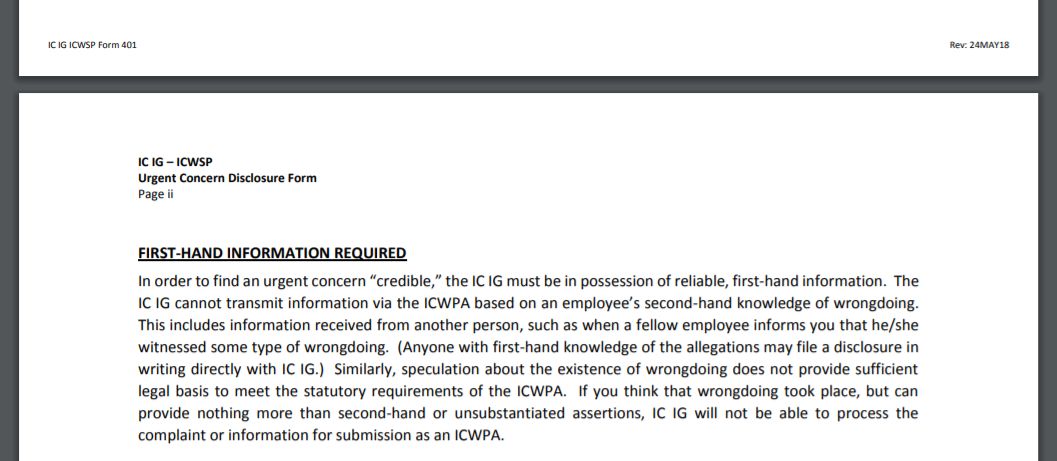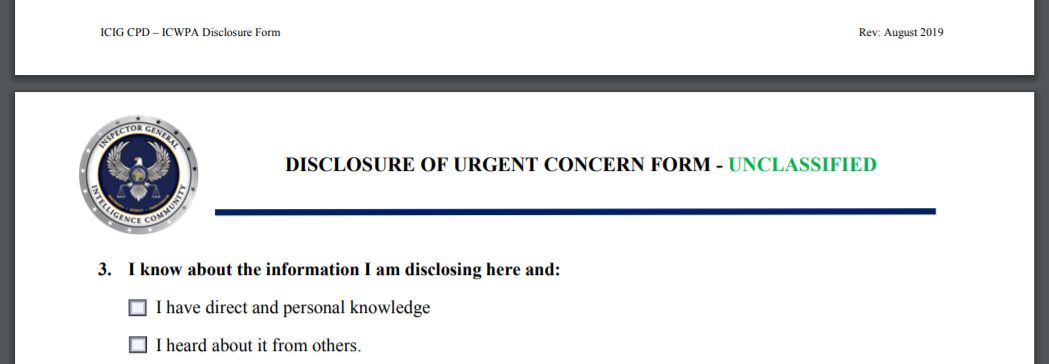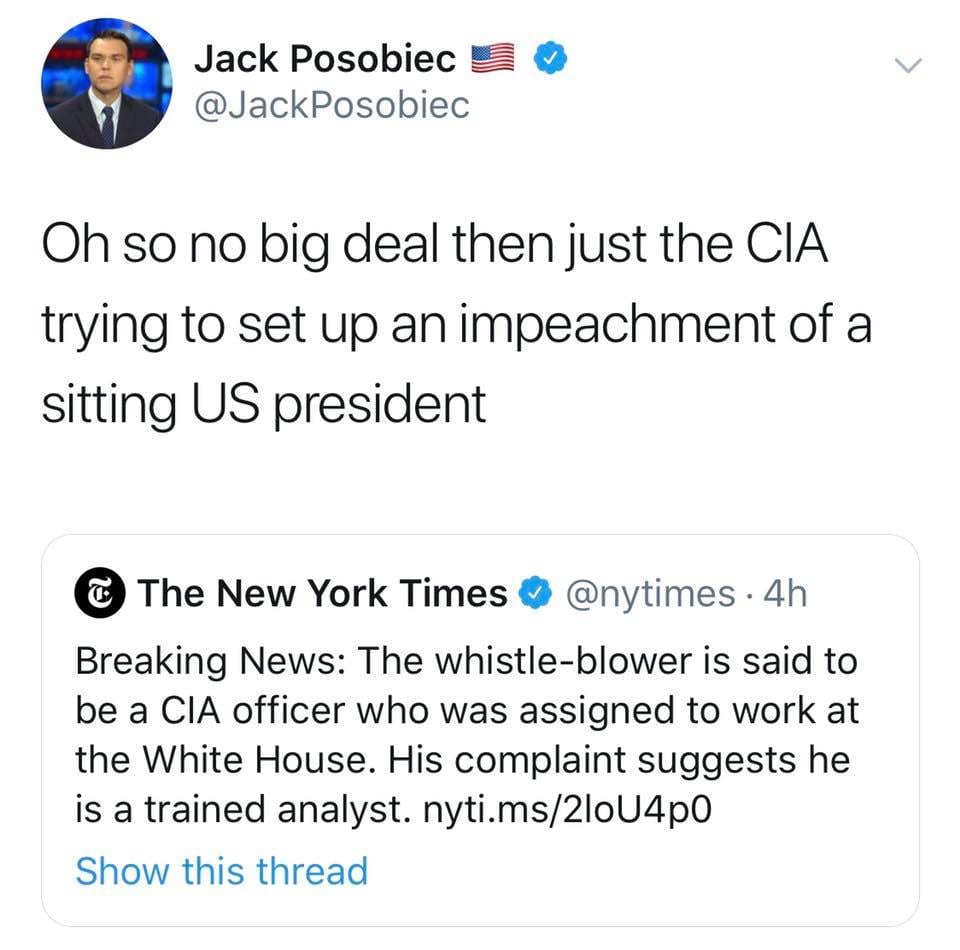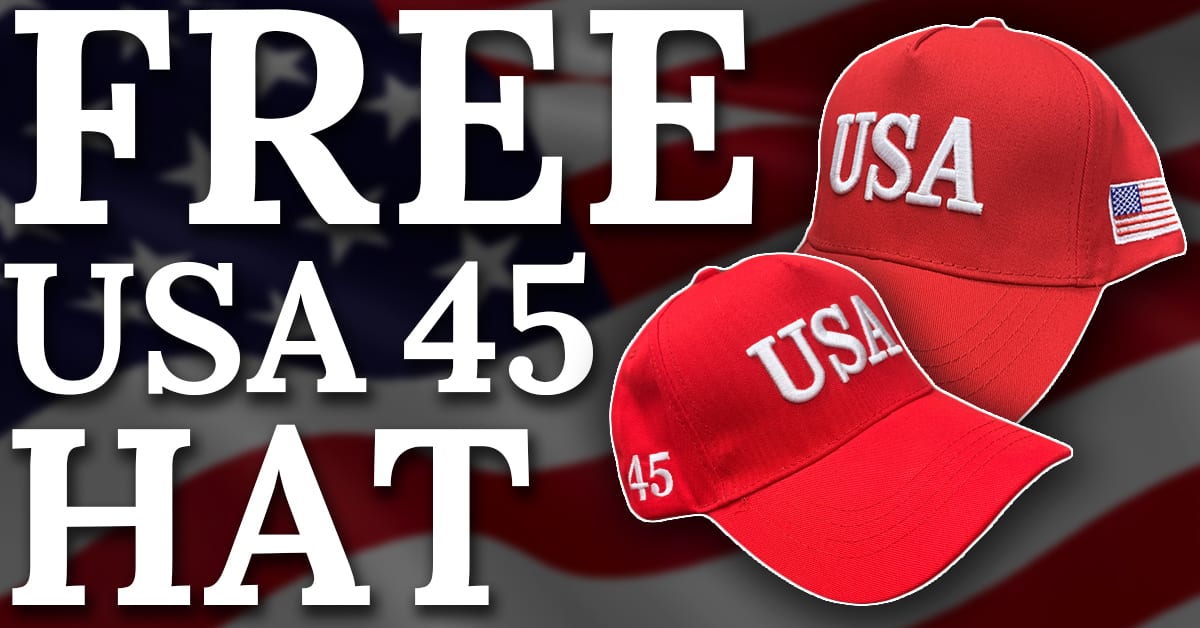Well isn’t that convenient!
The whistleblower form that was used to file the Ukraine complaint against President Trump would not have been possible but for some secret last minute revisions last month by the intelligence community.
How about that!
Just coincidence I’m sure.
Just like all of the stunning coincidences that revolve around a certain day in September that comes after the 10th and before the 12th….if you get my drift.
The Federalist has more on this stunning coincidence:
Between May 2018 and August 2019, the intelligence community secretly eliminated a requirement that whistleblowers provide direct, first-hand knowledge of alleged wrongdoings. This raises questions about the intelligence community’s behavior regarding the August submission of a whistleblower complaint against President Donald Trump. The new complaint document no longer requires potential whistleblowers who wish to have their concerns expedited to Congress to have direct, first-hand knowledge of the alleged wrongdoing that they are reporting.
The brand new version of the whistleblower complaint form, which was not made public until after the transcript of Trump’s July 25 phone call with the Ukrainian president Volodymyr Zelensky and the complaint addressed to Congress were made public, eliminates the first-hand knowledge requirement and allows employees to file whistleblower complaints even if they have zero direct knowledge of underlying evidence and only “heard about [wrongdoing] from others.”
The internal properties of the newly revised “Disclosure of Urgent Concern” form, which the intelligence community inspector general (ICIG) requires to be submitted under the Intelligence Community Whistleblower Protection Act (ICWPA), show that the document was uploaded on September 24, 2019, at 4:25 p.m., just days before the anti-Trump complaint was declassified and released to the public. The markings on the document state that it was revised in August 2019, but no specific date of revision is disclosed.
The complaint alleges that President Donald Trump broke the law during a phone call with the Ukrainian president. In his complaint, which was dated August 12, 2019, the complainant acknowledged he was “not a direct witness” to the wrongdoing he claims Trump committed.
UNREAL: Democrats Want Gang Members To Be Exception To Red Flag Laws!
A previous version of the whistleblower complaint document, which the ICIG and DNI until recently provided to potential whistleblowers, declared that any complaint must contain only first-hand knowledge of alleged wrongdoing and that complaints that provide only hearsay, rumor, or gossip would be rejected.
“The [Intelligence Community Inspector General] cannot transmit information via the ICPWA based on an employee’s second-hand knowledge of wrongdoing,” the previous form stated under the bolded heading “FIRST-HAND INFORMATION REQUIRED.” “This includes information received from another person, such as when an employee informs you that he/she witnessed some type of wrongdoing.”
“If you think that wrongdoing took place, but can provide nothing more than second-hand or unsubstantiated assertions, [the Intelligence Community Inspector General] will not be able to process the complaint or information for submission as an ICWPA,” the form concluded.
Markings on the previous version of the Disclosure of Urgent Concern form show that it was formally approved on May 24, 2018. Here is that original Disclosure of Urgent Concern form prior to the August 2019 revision:
Here is the revised Disclosure of Urgent Concern form following the August 2019 revision:
The Ukraine call complaint against Trump is riddled not with evidence directly witnessed by the complainant, but with repeated references to what anonymous officials allegedly told the complainant: “I have received information from multiple U.S. Government officials,” “officials have informed me,” “officials with direct knowledge of the call informed me,” “the White House officials who told me this information,” “I was told by White House officials,” “the officials I spoke with,” “I was told that a State Department official,” “I learned from multiple U.S. officials,” “One White House official described this act,” “Based on multiple readouts of these meetings recounted to me,” “I also learned from multiple U.S. officials,” “The U.S. officials characterized this meeting,” “multiple U.S. officials told me,” “I learned from U.S. officials,” “I also learned from a U.S. official,” “several U.S. officials told me,” “I heard from multiple U.S. officials,” and “multiple U.S. officials told me.”
The repeated references to information the so-called whistleblower never witnessed clearly run afoul of the original ICIG requirements for “urgent concern” submissions. The change to the “urgent concern” submission form was first highlighted on Twitter by researcher Stephen McIntyre.
The complainant also cites publicly available news articles as proof of many of the allegations.
“I was not a direct witness to most of the events” characterized in the document, the complainant confessed on the first page of his August 12 letter, which was addressed to Rep. Adam Schiff (D-Calif.) and Sen. Richard Burr (R-N.C.), the respective chairmen of the House and Senate intelligence committees. Hearsay is generally inadmissible as evidence in U.S. federal and state courts since it violates the constitutional requirement that the accused be given the opportunity to question his accusers.
The anti-Trump complaint also made several false claims that have been directly refuted and debunked. While the complaint alleged that Trump demanded that Ukraine physically return multiple servers potentially related to ongoing investigations of foreign interference in the 2016 elections, the transcript of the call between Trump and Zelensky shows that such a request was never made.
The complainant also falsely alleged that Trump told Zelensky that he should keep the current prosecutor general at the time, Yuriy Lutsenko, in his current position in the country. The transcript showed that exchange also did not happen.
Additionally, the complaint falsely alleged that T. Ulrich Brechbuhl, a U.S. State Department official, was a party to the phone call between Trump and Zelensky.
“I was told that a State Department official, Mr. T. Ulrich Brechbuhl, also listened in on the call,” the complaint alleged. Shortly after the complaint was released, CBS News reported that Brechbuhl was not on the phone call.
In a legal opinion that was released to the public along with the phone call transcript, the Department of Justice (DOJ) Office of Legal Counsel (OLC) determined that the complainant’s submission was statutorily deficient and therefore was not required to be submitted to Congress. The White House nonetheless declassified and released the document to Congress late Wednesday evening.
“The complaint does not arise in connection with the operation of any U.S. government intelligence activity, and the alleged misconduct does not involve any member of the intelligence community,” the September 3 OLC opinion noted. “Rather, the complaint arises out of a confidential diplomatic communication between the President and a foreign leader that the intelligence-community complainant received secondhand.”







Join the conversation!
Please share your thoughts about this article below. We value your opinions, and would love to see you add to the discussion!